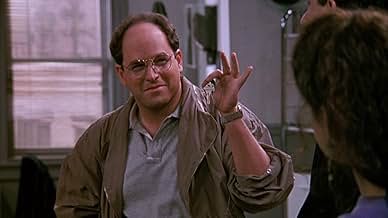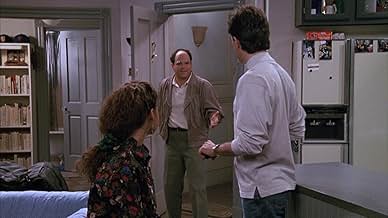The Robbery
- Episode aired Jun 7, 1990
- TV-PG
- 23m
IMDb RATING
7.4/10
5.7K
YOUR RATING
After Jerry's apartment is robbed, Jerry starts to look for other apartments. But Jerry and George both want the same apartment, and Elaine wants the apartment of whoever loses out.After Jerry's apartment is robbed, Jerry starts to look for other apartments. But Jerry and George both want the same apartment, and Elaine wants the apartment of whoever loses out.After Jerry's apartment is robbed, Jerry starts to look for other apartments. But Jerry and George both want the same apartment, and Elaine wants the apartment of whoever loses out.
- Director
- Writer
- All cast & crew
- Production, box office & more at IMDbPro
7.45.7K
1
2
3
4
5
6
7
8
9
10
Featured reviews
Brilliant, just brilliant!
Not that many people would think of making a stand-up routine about giving someone the finger, right? Well, Jerry Seinfeld does so in this episode's opening sequence, explaining how said gesture is ultimately pointless (giving the toe would be much bolder, in his opinion) and thus inducing the first of several laughs that will come over the course of 23 minutes.
This is the one where Kramer's idiocy fully manifests itself: having been asked to watch Jerry's apartment, he accidentally leaves the door open, allowing thieves to get in and steal the TV. The reactions to the event are among the best ever conceived for a comedy show: Jerry entering the apartment and turning on the television only to realize it's gone is funny; Kramer explaining what happened (he was distracted by The Bold and the Beautiful) is funnier; Jerry describing his hyper-safe lock and its only defect ("The door... must be CLOSED!") is genius; the final assertion about everyone's favorite goof-ball ("I'm human" "In your way") is a masterclass in sardonic humor.
But it's not just about Kramer: as usual, George and Elaine get their moment in the spotlight, especially in the second half of the episode, where the former competes with Jerry over getting a new apartment (cue a discussion about coin-flipping) and the latter decides to take the one of whomever loses (the scene where she refers to Jerry's place as "moving from Iceland to Finland" is the best Elaine moment of Season 1). This section also shows the first real glimpse of the series' ground-breaking "no hugging, no learning" mantra: no matter what happens, the characters always end each episode as shamelessly selfish and shallow as they were at the start, even when they come close to disrupting their friendship. This is confirmed by the perfectly timed, instantly memorable closing line, the delivery of which only constitutes further proof of how audacious Seinfeld was and still is.
This is the one where Kramer's idiocy fully manifests itself: having been asked to watch Jerry's apartment, he accidentally leaves the door open, allowing thieves to get in and steal the TV. The reactions to the event are among the best ever conceived for a comedy show: Jerry entering the apartment and turning on the television only to realize it's gone is funny; Kramer explaining what happened (he was distracted by The Bold and the Beautiful) is funnier; Jerry describing his hyper-safe lock and its only defect ("The door... must be CLOSED!") is genius; the final assertion about everyone's favorite goof-ball ("I'm human" "In your way") is a masterclass in sardonic humor.
But it's not just about Kramer: as usual, George and Elaine get their moment in the spotlight, especially in the second half of the episode, where the former competes with Jerry over getting a new apartment (cue a discussion about coin-flipping) and the latter decides to take the one of whomever loses (the scene where she refers to Jerry's place as "moving from Iceland to Finland" is the best Elaine moment of Season 1). This section also shows the first real glimpse of the series' ground-breaking "no hugging, no learning" mantra: no matter what happens, the characters always end each episode as shamelessly selfish and shallow as they were at the start, even when they come close to disrupting their friendship. This is confirmed by the perfectly timed, instantly memorable closing line, the delivery of which only constitutes further proof of how audacious Seinfeld was and still is.
"The Stakeout" got George just right in his one brief scene and this episode manages to get Kramer just right with his one scene
"The Robbery" doesn't entirely work for me since it is still a somewhat stilted and awkward affair but it is worth noting that Kramer is finally realized in this episode. He's no longer so aloof that he's a shut-in as he was portrayed in the pilot but rather someone who operates on some seeming level of normality. Even if everything that happens in his own world is bizarre and inexplicable, there's a slightly more grounded appeal to Kramer here which is part of what makes him so delightful. He's more sociable in how he's presented and the fact that he left the door to Jerry's apartment open, which was subsequently robbed, is hilarious as is the manner with which it was presented. It's but one brief moment in this half hour episode but it filled me with a sort of delight.
Matt Goldman furthers on David and Seinfeld's small work on the character in "The Stakeout" and while 'real estate agent' George is not a character to whom I have any particular memory or prior feelings, he is well portrayed here. There is a sense of George as someone who feels pathetic, so much so that he finds and offers Jerry a wonderful apartment and then begins to desire it himself. That's a classic George Costanza moment but here it doesn't quite reap the laughs for me.
If there's a character that I still feel is a bit lacking in the qualities that make them who they are later on, it's Elaine. Many of her lines continue to fall flat for me and while Julia Louis Dreyfus is fine, there just is not much for her character as of yet.
Jerry is the straight man and both this episode and its predecessor have sufficiently portrayed him as the mostly straight man. He's generally fairly comfortable around women, leaves a mostly normal life and often cracks weak jokes.
"The Robbery" has a nice ending that as another user stated here, really enforces the spirit of the show as one in which its characters never grow. There's no real sentimentality in this episode and if anything, the characters begin to act in a more selfish tone as would become the norm with the show and a large reason behind its legacy.
The issue that I find reviewing the early episodes of the show continues in that much of my criticism helms from the fact that I cannot help but make comparisons to the show that it goes onto become, the show I love, and in doing so, most of my criticisms are drawn out of context. "The Robbery" is mildly amusing but in my opinion, a slight step down from its predecessor. Seinfeld is finding its way slowly but surely however.
Matt Goldman furthers on David and Seinfeld's small work on the character in "The Stakeout" and while 'real estate agent' George is not a character to whom I have any particular memory or prior feelings, he is well portrayed here. There is a sense of George as someone who feels pathetic, so much so that he finds and offers Jerry a wonderful apartment and then begins to desire it himself. That's a classic George Costanza moment but here it doesn't quite reap the laughs for me.
If there's a character that I still feel is a bit lacking in the qualities that make them who they are later on, it's Elaine. Many of her lines continue to fall flat for me and while Julia Louis Dreyfus is fine, there just is not much for her character as of yet.
Jerry is the straight man and both this episode and its predecessor have sufficiently portrayed him as the mostly straight man. He's generally fairly comfortable around women, leaves a mostly normal life and often cracks weak jokes.
"The Robbery" has a nice ending that as another user stated here, really enforces the spirit of the show as one in which its characters never grow. There's no real sentimentality in this episode and if anything, the characters begin to act in a more selfish tone as would become the norm with the show and a large reason behind its legacy.
The issue that I find reviewing the early episodes of the show continues in that much of my criticism helms from the fact that I cannot help but make comparisons to the show that it goes onto become, the show I love, and in doing so, most of my criticisms are drawn out of context. "The Robbery" is mildly amusing but in my opinion, a slight step down from its predecessor. Seinfeld is finding its way slowly but surely however.
Decisions, Decisions!
Jerry's apartment is robbed and he feels he should look elsewhere. George has the perfect apartment but when he sees it, he wants it for himself. The problem is that by both of them being generous, they blow the whole thing.
Elaine is actually the one with the most to lose.
Elaine is actually the one with the most to lose.
Thought-Provoking Commentary
Everyone is either a Jerry or a George. Kramer is 80% George 20% Jerry. Larry David is 65% Jerry 35% George. Tom Cruise is 95% Jerry. Elaine is 140% Jerry. George is 10% Jerry but Jerry is 0% George. My dad was a George but my mom was a Jerry. That was tough
Elaine To The Rescue?
Another flat opening monolog. Isn't it too early for this "comedy genius" to be bombing?
Maybe the episode itself will be funny. Nope, it wasn't.
Oh, and by the way, every "audience" has the same actors. See for yourselves.
Maybe the episode itself will be funny. Nope, it wasn't.
Oh, and by the way, every "audience" has the same actors. See for yourselves.
Did you know
- TriviaKramer makes his first sliding entrance in this episode. According to Michael Richards, he was late on his cue, so he compensated by coming in very fast. When the audience laughed, he decided to keep the sliding entrance, and it eventually became a trademark.
- GoofsAt the housewarming they are introduced to the waitress's new neighbour, as she walks away George (Jason Alexander) mumbles "Nice meeting you" and shakes the waitress's hand instead of the neighbour's.
- ConnectionsFeatured in Nostalgia Critic: The Purge (2014)
- SoundtracksI Hope I Get It
(uncredited)
Music by Marvin Hamlisch
Lyrics by Ed Kleban
Performed by Julia Louis-Dreyfus
Details
- Release date
- Country of origin
- Language
- Filming locations
- Production companies
- See more company credits at IMDbPro
Contribute to this page
Suggest an edit or add missing content













